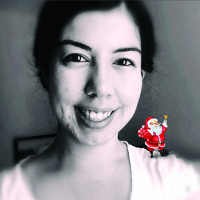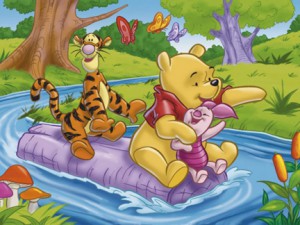
BY MELEK CANSU PETEK (ELIT/III)
petek@ug.bilkent.edu.tr
As I have only a few columns left to write before I graduate and say good-bye to the Bilkent News family, lately I’ve been putting more thought into what to write. You know, thinking about leaving a legacy here, saying my final words to the Bilkent community that I’ve been a part of for so many years—way too many years, perhaps! As I was pondering, I was happy to realize that I’ve written on many topics that I care deeply about, and that I’ve gotten to share my heart and life with you (though you weren’t really given a chance to refuse). Yet there is one piece of wisdom that I’ve never shared with you Bilkenters, and now is the moment—be prepared to meet the wisest Bear of all time: Winnie-the-Pooh.
I know, I know, you’re probably thinking that I’ve finally lost my mind, but hear me out first. I’ve always loved reading A. A. Milne’s timeless classic, “Winnie-the-Pooh,” because it’s probably one of the cutest, sweetest books that has ever been written. Along with the Little Prince, Pooh Bear is one of my favorite characters—charming, sweet, humble and wise—and recently I discovered that I’m not the only one who thinks that way. In fact, Benjamin Hoff even wrote a book about the pearls of wisdom you can find in Milne’s story, and used it to explain the basics of Taoism.
Now, the important thing to know about Taoism is that unlike other “isms,” it isn’t put together to make your life miserable with a lot of rules and a constant degrading of your physical nature to elevate your mental state. Tao means “the Way,” with a reference to the way of the universe, and Taoism is all about harmony and simplicity—it is living in everyday life and learning from it, instead of forcing our rules onto it and creating chaos.
You may be wondering how that’s related to Pooh Bear at all. Well, Winnie happens to be an exemplary figure of this philosophy. It turns out that one of the key principles of Taoism, the Uncarved Block, is called P’u in Chinese, which means “natural, simple, honest.” Do you see the connection now? Pooh Bear is the very definition of simple and honest. If you’ve read Milne’s books, or seen the cartoons, you know that Pooh Bear is not stupid at all. In fact, he solves some of the problems Owl and Rabbit fail to solve. What makes him different (and very lovable) is that he is simpleminded. He isn’t arrogant, gloomy, knowledgeable or complex—Pooh Bear is fun, because he simply is. When he and Piglet try to find a reason to visit their friends, he is the one who comes up with the perfect idea: “We’ll go because it’s Thursday. And we’ll go to wish everybody a Very Happy Thursday.”
Okay, here comes the part where I explain what on earth Cottleston Pie is. It is a song Pooh Bear makes up during one of his adventures—wouldn’t it be so lovely to have a friend who just goes around singing wonderful songs like this? Well, actually, Cottleston Pie doesn’t have a meaning as far as I know, but the Wise Bear says it’s the answer to all riddles. Benjamin Hoff explains that as, “Things are as they are,” but Pooh Bear (with whom Hoff has an imaginary dialogue in the book) doesn’t like this all that much, so we’ll stick with Cottleston Pie.
 You might be wondering why any adult would bother to care about this pie song, and I’d happily respond to you that it’s a beautiful song (which should be enough), but there’s more to it. One of the lines in the song is as follows: “A fly can’t bird, but a bird can fly.” I don’t know if you appreciate the pun, but this is probably one of the most obvious yet easily forgotten lessons out there: Everything and everyone has its own capabilities, and we often force ourselves to do things we aren’t meant to be doing. That doesn’t necessarily mean that you should give up and do nothing. But just as I’ve said a billion times before, it’s important to find what you are good at, passionate for in life, and simply do that. Being aware of your own nature and abilities is the key to a more joyful life, and knowing your gifts is an incredible blessing.
You might be wondering why any adult would bother to care about this pie song, and I’d happily respond to you that it’s a beautiful song (which should be enough), but there’s more to it. One of the lines in the song is as follows: “A fly can’t bird, but a bird can fly.” I don’t know if you appreciate the pun, but this is probably one of the most obvious yet easily forgotten lessons out there: Everything and everyone has its own capabilities, and we often force ourselves to do things we aren’t meant to be doing. That doesn’t necessarily mean that you should give up and do nothing. But just as I’ve said a billion times before, it’s important to find what you are good at, passionate for in life, and simply do that. Being aware of your own nature and abilities is the key to a more joyful life, and knowing your gifts is an incredible blessing.
One of my favorite passages in “Winnie-the-Pooh” shows how simple that act of knowing can be sometimes. When Rabbit kindly tells Pooh that he doesn’t have any brain, Pooh humbly says “I know”—and he really does! Pooh Bear is a Silly Old Bear who never has claimed to be the smartest bear out there. But he is the one who holds the group together, goes on trips to wish his friends happy Thursday, finds Eeyore’s tail, and makes everyone smile. And as far as I’m concerned, that is the greatest achievement anyone can ever have. Happy Thursday, everyone! And don’t forget your Cottleston Pie!
